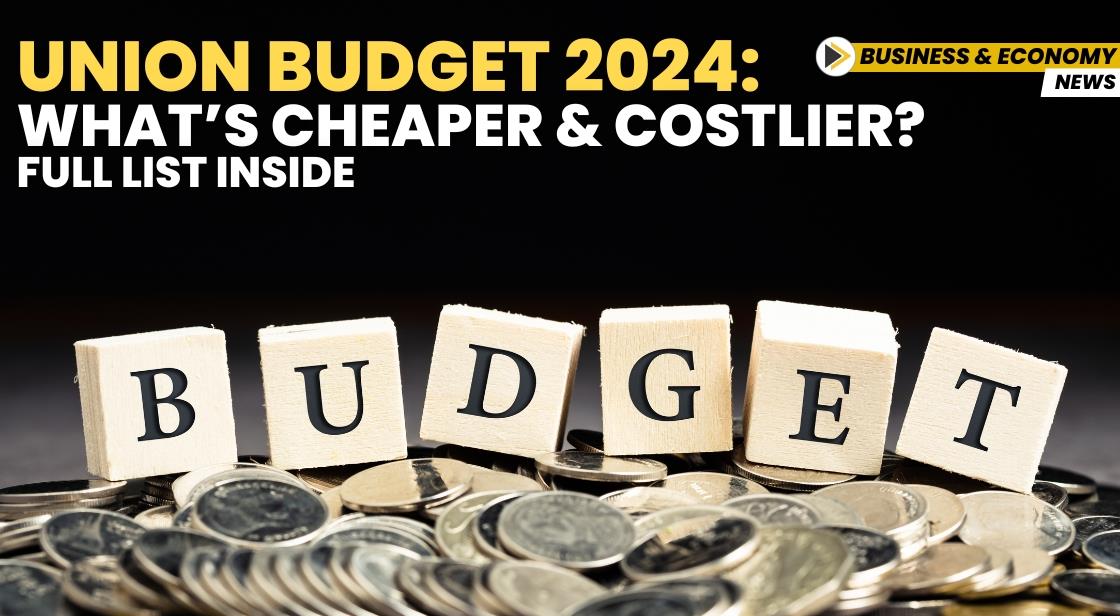Union Budget 2024: What’s Cheaper and Costlier? Full List Inside

News Synopsis
Finance Minister Nirmala Sitharaman presented her seventh Union Budget today for the fiscal year 2024-2025. This budget, the first under the BJP-led NDA government's new term, introduces significant changes across various sectors, aiming to impact infrastructure, social welfare, and more.
Among the key announcements, Sitharaman revealed substantial reductions in customs duties on several items to make essential goods more affordable. Specifically, the budget introduces lower duties on cancer medicines and mobile phones, which is expected to reduce retail prices. Additionally, imported gold, silver, leather goods, and seafood will also become more affordable.
Here's a breakdown of how the budget might impact your spending:
Items Becoming Cheaper:
-
Essential Goods: The budget prioritizes affordability by slashing customs duties on critical items. This translates to lower retail prices for mobile phones and cancer medicines.
-
Precious Metals: Gold, silver, and platinum will become more accessible due to reduced import taxes. This might stimulate demand but could also affect the trade deficit.
-
Seafood and Leather Goods: Consumers can expect some relief on seafood and leather products due to reduced customs duties.
Price Changes:
-
Mobile Phones: Expect to see a drop in mobile phone prices due to a decrease in import duties on phones, chargers, and other components.
-
Metals: Customs duties on gold and silver will go down to 6%, while those on platinum will decrease to 6.5%.
-
Cancer Treatment: Three additional cancer drugs will be exempted from customs duties, making them more affordable.
-
Seafood Industry: The budget reduces import duties on specific seafood items like brood stock, shrimp, and fish feed.
-
Solar Energy: The government will not extend customs duties on parts related to solar energy, potentially lowering costs in the sector.
-
Manufacturing: Import taxes on essential materials like ferronickel and blister copper will be eliminated, potentially aiding domestic manufacturing.
-
Footwear: The budget reduces customs duties on leather and footwear manufacturing, impacting production costs.
Items Getting More Expensive:
-
Environmental Impact: The budget aims to discourage non-biodegradable plastics with a higher customs duty of 25%.
-
Explosives: Ammonium nitrate will see a rise in customs duty to 10%.
-
Telecom Equipment: The import of telecom equipment will become more expensive due to an increased customs duty.
-
High-Value Transactions: A new 1% Tax Collection at Source (TCS) will apply to specific goods exceeding Rs 10 lakh.
Union Budget 2024-25 Tax Relief:
The budget offers some tax relief for salaried individuals under the new tax regime by raising the standard deduction from Rs 50,000 to Rs 75,000. This translates to potentially higher disposable income for taxpayers.
Continuing the Trend:
This budget builds on the previous year's focus on import tax reductions for components like camera lenses. This aligns with the "Make in India" initiative by making essential components more affordable for domestic manufacturers.
Conclusion
The Union Budget 2024-25 presented by Finance Minister Nirmala Sitharaman introduces significant changes aimed at making essential goods more affordable and stimulating economic growth. The substantial reductions in customs duties on mobile phones, cancer drugs, and precious metals are expected to benefit consumers directly. Conversely, increases in duties on items like ammonium nitrate and non-biodegradable plastics reflect the government's focus on sustainable practices and revenue generation.
The budget's emphasis on social welfare and infrastructure development, coupled with measures to support the middle class through increased standard deductions, showcases a balanced approach to economic policy. These initiatives align with the broader goals of fostering growth, inclusivity, and sustainability during the "Amrit Kaal" period leading up to India's centenary.
As the nation navigates this new fiscal year, the adjustments and strategic investments outlined in Budget 2024-25 set a clear path toward a more developed and resilient India. The focus on affordability, domestic manufacturing, and social welfare underscores the government's commitment to building a stronger, more inclusive economy for all citizens.
You May Like









